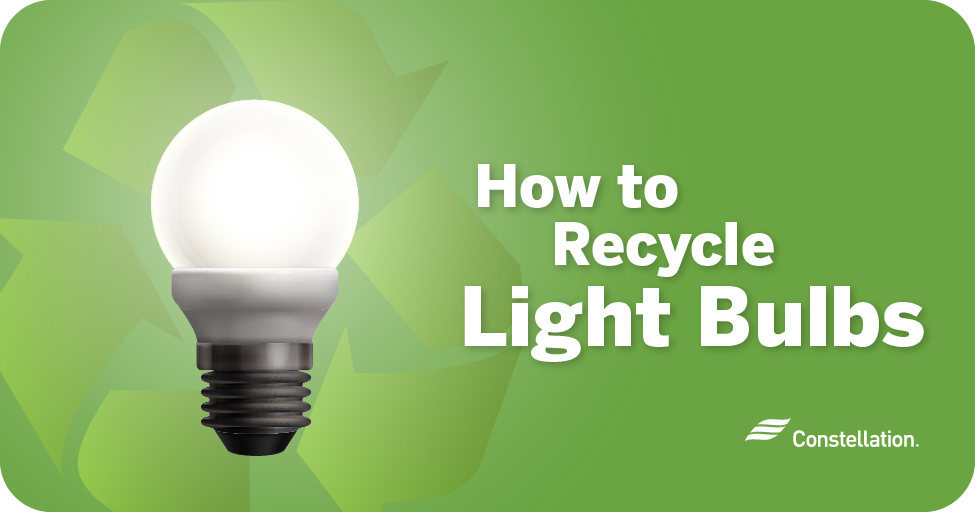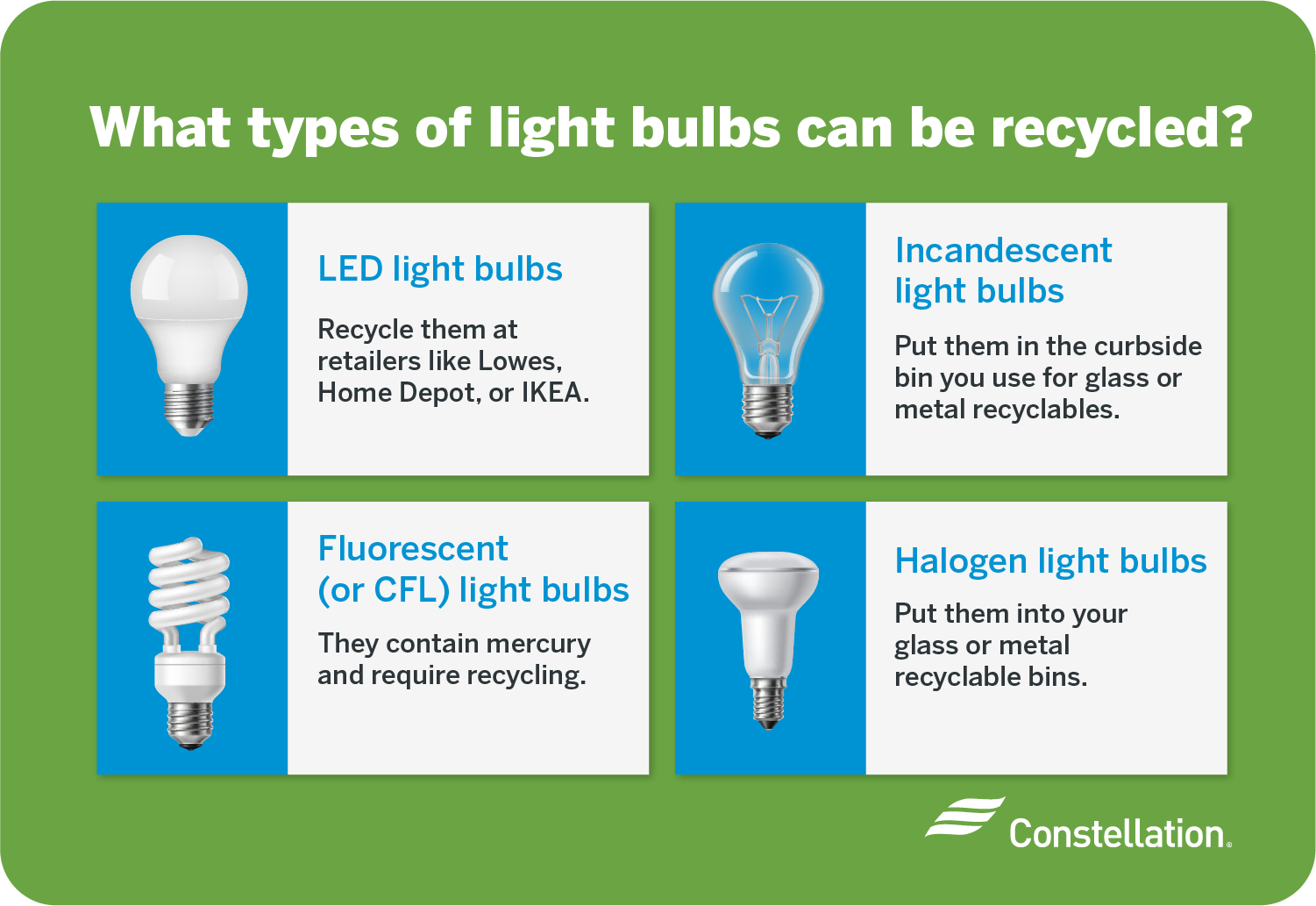
- Category:
Energy Efficiency -
Last updated:
June 22, 2022
How to Recycle Light Bulbs
Innovations in lighting technology have produced bulbs that last longer than ever. But there is a downside. They sometimes contain metals and other materials that can be toxic to the environment if not disposed of properly. Recycling light bulbs keeps those pollutants from causing damage and gives a second life to the materials used to make them. It’s a double win.
Recycling light bulbs is not hard to do, but different types of light bulbs need to be handled differently. Here we will give you all the details you need about how to recycle light bulbs of all kinds so you won’t be left wondering: What do you do with old light bulbs?
What types of light bulbs can or cannot be recycled?
Are light bulbs recyclable? Yes, the most common types of household light bulbs, from the traditional incandescent variety to those used in energy-efficient lighting fixtures, like
halogen and fluorescent and CFL (compact fluorescent lights), are all recyclable. Smart light bulbs, with their additional electronics, offer more valuable material for recycling. Each, however, requires different methods when it comes to getting rid of them.
Additionally, local regulations may specify how to recycle light bulbs, where to recycle light bulbs in your area and what bulbs can be recycled.
How to recycle LED light bulbs
How to recycle incandescent light bulbs
How to recycle halogen light bulbs
How to recycle fluorescent or CFL light bulbs

How to recycle LED light bulbs
LED light bulbs are not only a highly efficient option, they are also relatively safe. While they contain some nickel and lead, they are not manufactured with dangerous gases and other substances that require special care. In comparing LED vs. CFL bulbs, this is one of the major differences.
The question isn’t can you recycle LED light bulbs, but should you. The answer is yes. The plastics, metals, and glass used in them are all valuable, once separated out for reuse. LEDs make for energy-efficient decorative lights, which include significant amounts of copper wiring, making them even more worth recycling. Energy-efficient outdoor lighting is more often than not made with LED bulbs that can be recycled.
The biggest danger in disposing of LED light bulbs is the razor-sharp glass shards that can result when they shatter. Many recycling centers ask that you put each bulb into a plastic bag to contain the pieces if the bulb shatters. You generally cannot recycle LED light bulbs in your regular curbside pick-up bins.
Many retailers like Lowes, Home Depot and IKEA have recycling bins at some stores. You can also call your local municipality to see if they have light bulb recycling locations or special days. If you can’t find anywhere local, some retailers and waste management companies allow you to mail them in for a fee.
How to recycle incandescent light bulbs
Incandescent light bulbs do not contain serious toxins. However, neither do they contain significant amounts of material worth recycling. You can put them in the same curbside bin you use for glass or metal recyclables. Because the glass shards can be sharp when the bulb breaks, you might want to put them in a paper or plastic bag, if your recycling company allows those items to be mixed with glass and metal. Many people do not bother with recycling incandescent bulbs because they are more difficult to recycle than the material they are made of is worth.
How to recycle halogen light bulbs
Like traditional incandescent light bulbs, halogen bulbs do not contain significant amounts of hazardous waste. They are made of glass and metal, but are filled with inert halogen gas that allows the bulb to burn more efficiently and last three times longer. You can put them into your glass or metal recyclable bins, as they do not need special treatment.
If allowed, you should wrap them in a plastic or paper bag to protect those handling the waste from getting cut. Because they are difficult to recycle, many people don’t bother recycling light bulbs made with halogen technology, instead putting them in with their regular household trash.
How to recycle fluorescent or CFL light bulbs
These types of bulbs are the most difficult to handle. In many areas, it is illegal to throw them away. Recycling is required. Handling them is tricky, since they contain mercury. This toxic metal can harm you if you are directly exposed to it or, if used bulbs are allowed into the environment, they can break and leach mercury into the soil and water table.
The EPA provides guidance for recycling light bulbs like these and provides a link to the Earth911 website that can help you find a safe place for disposing of CFL and fluorescent bulbs. This downloadable brochure has CFL safety tips for using and disposing of these kinds of bulbs.
You can also contact your local government for information about where you can recycle light bulbs with mercury in them.
Where to recycle light bulbs
When it comes to how to recycle light bulbs, just finding out where to recycle light bulbs is often the most challenging part of the whole process. Here are the best places for recycling light bulbs:
- Curbside recycling. This is a good option for incandescent and halogen light bulbs, but check with your municipality first to be sure they are allowed.
- Local retail stores. As a service to customers, many national chains and local retailers have recycling bins designed for LED or CFL bulbs.
- Recycling centers. If they take light bulbs, recycling centers often have special facilities set up for handling them.
- Waste management facilities. Some of the larger waste management companies either do recycling or can facilitate getting recyclables to specialists. You’ll need to contact those operating in your area to find out if they do it and how.
- Mail-in recycling. You can also mail your used bulbs–often for a fee–to companies that specialize in handling them.
Why is recycling light bulbs important?
Are light bulbs recyclable? Absolutely. They can be recycled. In many cases they should be recycled. And in some places, recycling is required. Rather than taking up space in landfills, the valuable component materials can be separated out and put to good use again. For some bulb technologies with toxic parts, recycling keeps those pollutants out of our environment.




